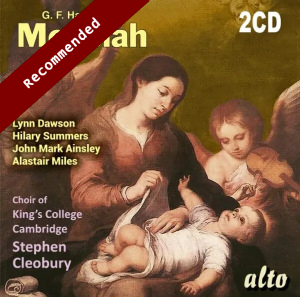
George Frideric Handel (1685-1759)
Messiah (Oratorio in 3 Parts, 1752 version)
Lynne Dawson (soprano), Hilary Summers (mezzo=soprano), John Mark Ainsley (tenor), Alastair Miles (bass), King’s College Choir Cambridge
Brandenburg Consort/Stephen Cleobury
rec. live, 1994, Pieterskerk, Leiden, Netherlands
Alto ALC2032 [2 CDs: 134]
This live performance was originally released on Columns Classics and is still available as a download from Brilliant; the CD version of the latter (plus DVD) was favourably reviewed by Robert Hugill back in 2011, but here appears newly released by the Alto label – and it came as a complete surprise to me; I thoroughly enjoy it from start to finish and it goes to the top of my favourite recordings alongside Colin Davis’ classic old performance on Philips from 1966.
It was recorded live in a Dutch church so there is sometimes a touch of over-reverberance but nothing of concern, and virtually no audience noise. Everything about it pleases: the late Stephen Cleobury’s tempi are brisk but not rushed, the balance between orchestra, choir and the four young soloists is fine and all the singers have stellar voices. The upper voices of the choir are trebles and male altos as per Handel’s preference – and very good they are, too. The choir is large enough to make an impact but is in no sense cumbersome; their altos do not turn hooty and the intonation of all four sections is excellent. Lynne Dawson’s soprano is silvery, agile and pure-toned, soaring easily; contralto Hilary Summers is a mezzo-soprano with contralto depth who sings gravely and sensitively, deploying her resonant lower register frequently but tastefully – listen to her low notes at the end of “refiner’s fire” – and coping well with the coloratura passages; tenor John Mark Ainsley is absolutely flawless and invariably beautiful of tone without turning too “white”; Alastair Miles’ bass is both ideally sonorous and agile. All four soloists employ some tasteful ornamentation but nothing excessive. The orchestra plays in period style but without any groaning, swooping or whining and matches the choir in volume and presence; they, too, are gratifyingly well-tuned. Cleobury’s approach is conservative – hardly different from Davis thirty years previously. The edition used is the later, four-soloist version with the shorter – and to my taste, preferable – version of “Why do the nations” and the solo soprano “He shall feed His flock”. You might miss the duet version of the latter, but Dawson’s singing is so lovely I do not mind.
I started to play this and listened straight through, captivated by the fleet grace of the singing and playing. In many ways, it represents a perfect compromise between the one extreme of a too weighty, old-fashioned performance style and what often sounds to my ears to be the etiolated, under-nourished affect of “hard-core” period practitioners – who too often employ singers with similarly under-powered voices. Furthermore, Alto is still a budget label, so the price is right. Obviously there is no libretto but the text is very familiar to most collectors and the singers’ enunciation is pellucid.
Ralph Moore
Buying this recording via a link below generates revenue for MWI, which helps the site remain free



















